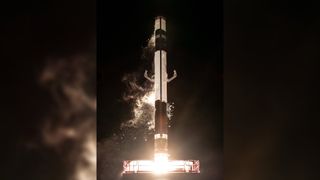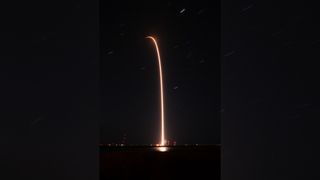
Rocket Lab's pioneering suborbital launch last month conducted hypersonic tests for the U.S. military, the company has revealed.
The mission in question lifted off on Nov. 24 from the Mid-Atlantic Regional Spaceport (MARS) on Virginia's Wallops Island. It employed HASTE, the suborbital variant of Rocket Lab's workhorse Electron launcher.
Less than 22 hours later, an Electron lofted five "Internet of Things" satellites to orbit for the French company Kinéis, notching an unprecedented spaceflight doubleheader for Rocket Lab.

"Mission success. 2 launches in less than 24 hours from 2 pads in 2 different hemispheres," Rocket Lab said via X shortly after the Electron liftoff.
Related: Rocket Lab launches 5 IoT satellites on landmark 50th mission (video)
For a while, Rocket Lab remained mum about the Nov. 24 mission, which was just the second ever for the HASTE vehicle. But the California-based company broke its silence on Monday (Dec. 9), announcing that the suborbital mission successfully tested "hypersonic technology for the Department of Defense."
"This mission provided hypersonic test launch capabilities under the Multi-Service Advanced Capability Hypersonics Test Bed (MACH-TB) project, which aims to increase hypersonic flight testing for the United States in support of technology maturation," Rocket Lab officials said in a statement on Monday.
Get the Space.com Newsletter
Breaking space news, the latest updates on rocket launches, skywatching events and more!
"Rocket Lab’s test platform showcased a new suite of cutting-edge technologies optimized for hypersonic technology tests with vastly increased payloads," the company added. "Rocket Lab also designed, manufactured, assembled and integrated the experimental hypersonic instrumentation which was launched on this mission, but on a highly accelerated timeline."
Rocket Lab hit another milestone on its Nov. 25 orbital mission, which it called "Ice AIS Baby:" The launch pushed the total number of satellites deployed by the 59-foot-tall (18 meters) Electron over 200, to 203.
Electron has now flown a total of 54 times, including 13 times so far this year. HASTE's lone mission before the Nov. 24 flight, which Rocket Lab called "HASTE A La Vista," launched in June 2023, also from the MARS pad.
Join our Space Forums to keep talking space on the latest missions, night sky and more! And if you have a news tip, correction or comment, let us know at: [email protected].

Michael Wall is a Senior Space Writer with Space.com and joined the team in 2010. He primarily covers exoplanets, spaceflight and military space, but has been known to dabble in the space art beat. His book about the search for alien life, "Out There," was published on Nov. 13, 2018. Before becoming a science writer, Michael worked as a herpetologist and wildlife biologist. He has a Ph.D. in evolutionary biology from the University of Sydney, Australia, a bachelor's degree from the University of Arizona, and a graduate certificate in science writing from the University of California, Santa Cruz. To find out what his latest project is, you can follow Michael on Twitter.